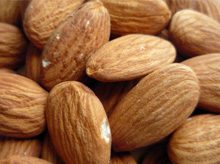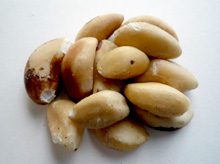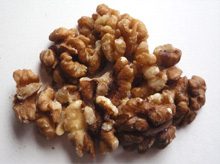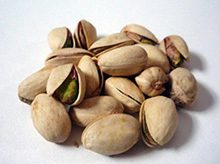Tree nuts and peanuts are eaten worldwide and seen as convenient tasty snacks which may contribute to a healthy lifestyle. They also come cholesterol-free and full of nutrients, including protein and fiber. However, it is a sad fact of life some people may never get to enjoy nuts because they have an allergic reaction to eating them.
For those of us who can eat nuts the list below will give you an idea of the nutrition of each nut.
Almond Nuts
Nutritional values per 100g serving (3.5 ounces)

- 260mg of calcium
- 51g of fat (primarily unsaturated)
- 17.0mcg of folate (Vitamin B9)
- 5.25mg of iron
- 296mg of magnesium
- 3.5mg of niacin (Vitamin B3)
- 474mg of phosphorus
- 215mg of potassium
- 18.7g of protein
- 0.8mg of riboflavin (Vitamin B2)
- 17mg of sodium
- 28mg of tocopherols (dried, unblanched almonds) / 8mg of tocopherols (dry roasted almonds)
- 0.24mg of thiamin (Vitamin B1)
- 3mg of zinc
They’re also rich in monounsaturated fat, one of the two “good” fats responsible for lowering LDL cholesterol. More information for lowering your cholesterol can be found in Jen’s reviews
Almonds can be eaten on their own, either raw or toasted. They are often sprinkled over food with other nuts, particularly ice cream dishes. These particular nuts are a rich source of Vitamin E containing 24mg per 100g and are a high source of Calcium.
It is a well-known fact that almonds along with other nuts should be avoided if you are on a diet to lose weight, this is because nuts come high in calories and fats. However, it would appear that this fact may not be true.
A study was carried out by experts at Purdue University USA on 20 women between the age of 25 to 30 with BMI counts higher than normal. The test consisted of 10 women being supplemented for a 10-week period with 2 servings of almonds per day. Each serving of almonds contained 300 calories, the other ten participants did not receive a diet supplemented with almonds.
After a ten-week period, the situation was turned around, and those who had had their diet supplemented with almonds had them stopped. The 10 women who at first had no almond supplements now received them for a period of ten weeks.
Overall results of the study showed that women in the almond supplementation group did not experience hunger during the 10 week period and no change in their weight, BMI, or body fat was found. It would appear the results of the test proved that almonds do not cause an increase in weight, in fact, the very opposite was found the almonds had kept the individual from experiencing hunger during the day, cutting the problem of overeating.
Their findings have been published in the International Journal of Obesity. The lead researcher of the study at Purdue University USA had this to say:
We concluded that the women found their daily almond snack to be very filling, and so they naturally compensated in their caloric intake at other times of the day.
Richard Mattes – Purdue University USA
Clinical Dietitian and research fellow at the City of Hope National Medical Centre in Duarte, California added:
In order to be satisfied, there is a need to eat foods that contain fiber, protein, and fat, and nuts definitely qualify in that regard.
Study researcher Michelle Wien, DrPH, RD, CDE, – CHNMC
Brazil Nuts
Nutritional values per 100g serving (3.5 ounces)

- 744 calories
- 4g of protein
- 3.5g of carbohydrates
- 19g of fat
- 2g of fibre
- 45mg of calcium
- 107mg of magnesium
- 1.15mg of zinc
- 543.5mcg of selenium
- 1.62mg of vitamin E
- 0.28mg of thiamine (Vitamin B1)
Brazil nuts are an excellent source of Selenium as well as a good source of Magnesium and Thiamine. The Brazil nut is actually a seed. In its natural form, it is contained in hard pods which are round or pear-shaped very similar to that of a coconut. The pod contains between 10 and 20 Brazil nuts, extremely popular in both the US of A and the UK after shelling the nuts can be eaten raw, roasted, or salted.
The Brazil nut has a high selenium content. Selenium is also a powerful antioxidant making the nut/seed very popular to the health and cosmetics industries alike as well as being used as a lubricant for clocks. It is also used in the making of artists’ paints. The antioxidant has been said to stimulate the immune system and slow the aging process and protect against heart disease and certain forms of cancer.
Brazil nuts are high in minerals including zinc, and magnesium and contain useful amounts of phosphorous, copper, and iron. Like all nuts, Brazil nuts are an excellent source of protein and fiber. The fat contained in the nuts is healthy polyunsaturated, but care should be taken with these fats if you are on a diet.
Further information on Brazil nuts can be found on very well fit an excellent website that covers strength, keeping, fit, losing weight, healthy eating, food facts, and all things healthy.
Macadamia Nuts
Nutritional values per 100g serving (3.5 ounces)

- 53mg of calcium
- 716 calories
- 12.0g of carbohydrates
- No cholesterol
- 7.0g of dietary fiber
- 3.0g of polyunsaturated
- 63.4g of monounsaturates
- 76g of fat in total
- 2mg of niacin (Vitamin B3)
- 241mg of phosphorus
- 409mg of potassium
- 8g of protein
- 0,1mg of riboflavin
- 3mg of sodium
- 0.7mg of thiamin (Vitamin B1)
Macadamia nuts according to American nutritionist Dr. Amy E. Griel.
Macadamia nuts have higher levels of monounsaturated fats, the good fats, like those found in olive oil compared with other tree nuts.
Dr. Amy E. Griel. American nutritionist .
Apparently, researchers found that eating just a small handful of nuts a day reduces total cholesterol, low-density lipoprotein cholesterol (bad cholesterol), and triglyceride levels.
Loved for their flavor macadamia nuts have been avoided by most because of their fat content. Ramona Cappello, says:
“The nuts are very good for your health, especially for those following a low-carbohydrate diet”- Ramona Cappello
Macadamia nuts also contain flavonoids and vitamin E potent antioxidants which help protect against cancer and heart disease.
Macadamia nuts are highly nutritious. They have the highest amount of monounsaturated fats of any nut. They also contain 9% protein, 9% carbohydrate, 2% dietary fiber, calcium, phosphorus, potassium, sodium, selenium, iron, thiamine, riboflavin, and niacin. One way to enjoy this nut is in a cake, especially for those who have a problem eating nuts on their own. How does macadamia nut and coconut sponge cake with lime cream cheese topping, or Apricot almond cake with rosewater and cardamom sound to you? If this has given you an appetite for more then this link to the BBC food recipes website is for you.
Walnuts
Nutritional values per 100g serving (3.5 ounces)

- 688 calories
- Nil cholesterol
- 3.5g of fibre
- 2.23g of monounsaturated fat
- 7.5g of omega 3 fats
- 11.79g of polyunsaturated fat
- 450mg of potassium
- 8mcg of selenium
- 1.7mg of vitamin C
- 0.583mg of vitamin B6
- 3.9mg of vitamin E
- 2.7mcg of vitamin K
- 0.057mg of thiamin (Vitamin B1)
Walnuts are high in calories and while they’re an excellent source of monounsaturated fats and omega-3 fatty acids, along with pecans and chestnuts they have the highest antioxidant content of the tree nuts.
Although nuts have been considered a no-no if you’re on a diet, it has been proven to be unfounded. Eating nuts two, or three times a week can actually aid a diet. Walnuts can serve as a great addition to your diet. Because of their high concentration of omega-3 fats walnuts have often been thought of as brain food.
Also documented walnuts improve cholesterol profile in individuals with Type 2 Diabetes. Walnuts have a high antioxidant content which can help fight against cardiovascular and coronary heart diseases.
Pistachio Nuts
Nutritional values per 100g serving (3.5 ounces)

- 27.65g of carbohydrate
- 110mg of calcium
- 45.97g of fat
- 50μg of vitamin B9
- 4.2mg of iron
- 120mg of magnesium
- 1.425mg of vitamin B3
- 485mg of phosphorus
- 1042mg of potassium
- 21.35g of protein
- 0.158mg of vitamin B2
- 0.84mg of vitamin B1
- 1.274mg of vitamin B6
- 2.3mg of vitamin C
- 2.3mg of zinc
Experts now recognize pistachio nut eating to be rich in nutrients that reduce the hardening of the arteries which is considered one of the main causes of heart attacks, strokes, and heart disease. This makes them ideal as a quick snacks when used as part of a healthy eating plan.
Across the sea in the United States (USA.) researchers of the Pennsylvania State University carried out a study led by Dr. Penny Kris-Etherton on the humble pistachio nut. Volunteers were asked to supplement a low-fat diet with pistachio nuts. One group snacked on 1.5 ounces of the nuts a day, another group had double that amount while a third group had none.
After a one-month test period, researchers found a marked reduction in the cholesterol levels of those groups that had eaten the pistachios nuts. The results, published in the American Journal of Clinical Nutrition, showed levels of low-density lipoprotein – the ‘bad’ type of cholesterol – dropped by 11.6 percent after a few weeks in those eating two portions of pistachios a day.
Back a few years, there was evidence then that nuts were an excellent source of nutrition. In July 2003, the Food and Drug Administration (FDA) approved the first qualified health claim specific to nuts lowering the risk of heart disease
Scientific evidence suggests but does not prove that eating 1.5 ounces (42.5g) per day of most nuts, such as pistachios, as part of a diet low in saturated fat and cholesterol may reduce the risk of heart disease
Penny Kris-Etherton, Food and Drug Administration
Nuts are an excellent way to get vitamins such as folic acid, niacin, vitamins E and B6, as well as minerals like copper, magnesium, selenium, zinc, phosphorus, and potassium. Americans are encouraged by experts to eat a variety of foods every day to get all of our needed nutrients. Nuts fall into a food group that consists of; meat, poultry, fish, dry beans, eggs, and of course, nuts. Two to three foods from this group may be eaten per day.
Nuts on a whole are very nutritious, and as already mentioned, provide us with many of the essential vitamins and minerals. However, having said all that, you should remember that they’re also high in carbohydrates and oils, and should not be eaten in excess of the recommended guidelines.
Peanut and Nut Allergies
At the start of this page, I mentioned that some people can not eat nuts it’s a bit of a bind if you like nuts and find that you have an allergic reaction to them, especially if your allergy to them is always severe.
A severe reaction to nuts is called anaphylaxis shock and can be life-threatening. Tree nut allergies occur mainly, but not exclusively, in children.
Although we tend to class them as nuts, peanuts are actually legumes and not true nuts. They do however still cause allergic reactions due to the proteins being very similar to that of tree nuts.
If you do suffer from nut allergy symptoms they may show themselves within one hour. However, it is possible for the reaction to start within minutes of coming into contact with nuts. If this were to happen then it would become an emergency situation that would require immediate attention and treatment with epinephrine/adrenaline injection.
Below are a few of the symptoms that you might experience during an allergic reaction to nuts:
- Your mouth and lips might start to tingle.
- You may feel sick or nauseous.
- Lightheaded or feeling fainting.
- Your face may start to swell.
- Confusion.
- You may experience pains in your stomach similar to having colic (A stomach complaint generally found in babies a few weeks after birth).
For me to give extensive information on nut allergies would be rather foolish as I’m not a doctor and only have basic knowledge of what this allergy is capable of. If you do suffer from this complaint and you are looking for guidelines, then the following website may be just what you are looking for: www.patient.co.uk (I am not too sure if the UK medical information on nut allergy is the same as in the USA. or other countries, so please be aware that the link goes to a UK website.) Having said that I suppose people are people the world over and that goes for allergies also.